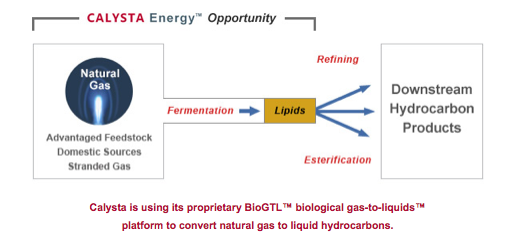As I’ve tweeted yesterday, there are so many press releases coming out this week because of ongoing two big conferences — BIO World Congress on Industrial Biotechnology and the ACS Green Chemistry & Engineering conference. Myriant already announced their on-spec bio-succinic acid production at its Louisiana plant while Gevo reported that it has restarted its bio-isobutanol production at its Minnesota plant.
I am now working on news from Verdezyne, LanzaTech, CSM (now called Corbion) and for this post, an announcement from NatureWorks/Calysta Energy.
This is a very interesting announcement from NatureWorks as the company said it has started collaboration with Calysta Energy on the use of methane as alternative feedstock for producing lactic acid instead of the traditional carbohydrate-based raw materials such as corn and sugarcane. Determining the feasibility of methane as a commercially viable feedstock for lactic acid may take up to five years, according to NatureWorks.
“If proven through this R&D collaboration, the new technology could be revolutionary because it will provide alternatives to the current reliance on agricultural feedstocks, and with the direct conversion of methane, it will greatly simplify the number of steps and operations needed to convert carbon into performance consumer products,” said Marc Verbruggen, president and CEO of NatureWorks. “This could structurally lower the cost of producing Ingeo.”
NatureWorks currently produces its Ingeo polylactic acid (PLA) resins in Blair, Nebraska, USA from corn starch, while its planned Southeast Asian PLA capacity will use sugarcane or even sugarcane bagasse as its second generation feedstock.
The collaboration with Calysta Energy will lead to additional feedstock source such as methane from waste materials or even from natural gas. By the way, for those who are not familiar with Calysta Energy, the company led by former Codexis CEO Alan Shaw, focuses on developing enzymes and organisms capable of efficiently converting waste gas into chemicals via its BioGTC™ biological gas-to-chemicals platform.
The project will evaluate potential sources of a methane feedstock for commercial-scale production of lactic acid as well as criteria such as purity, availability, price, location to customers, greenhouse gas sequestration potential and environmental/energy impacts. The companies will share commercialization rights for select products developed under the agreement.
Other companies who are looking to use methane and other waste gas feedstock for producing chemicals include LanzaTech, Novomer, Enerkem, Newlight Technologies, Oakbio, Carbon Sciences, Siluria…





